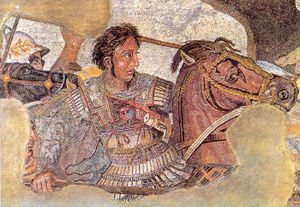Alexander the Great

Alexander the Great (Greek: Μέγας Αλέξανδρος[1] Megas Alexandros; July 21, 356 BC — June 11, 323 BC), also known as Alexander III, king of Macedon (336–323 BC), is considered one of the most successful military commanders in history, conquering most of his known world before his death. Alexander is also known in the Zoroastrian Middle Persian work Arda Wiraz Nāmag as "the accursed Alexander" due to his conquest of the Persian Empire and the destruction of its capital Persepolis. He is known as Eskandar in Persian and even acclaimed during the construction of the Great Wall Sadd-e Eskandar by the Parthian Dynasty[citation needed]. He is also known as Sikandar in Urdu and Hindi, a term also used as a synonym for "expert" or "extremely skilled".
Early life
Alexander the Great was the son of King Philip II of Macedonia and of his fourth wife, Epirote princess Olympias. According to Plutarch (Alexander 3.1,3), Olympias was impregnated not by Philip, who was afraid of her, and her affinity for sleeping in the company of snakes, but by Zeus Ammon. Plutarch (Alexander 2.2-3) relates that both Philip and Olympias dreamt of their son's future birth. Olympias dreamed of a loud burst of thunder and of lightning striking her womb. In Philip's dream, he sealed her womb with the seal of the lion. Alarmed by this, he consulted the seer Aristander of Telmessus, who determined that his wife was pregnant and that the child would have the character of a lion.
Aristotle was Alexander's tutor; he gave Alexander a thorough training in rhetoric and literature and stimulated his interest in science, medicine, and philosophy. After his visit to the Oracle of Ammon at Siwa, according to five historians of antiquity (Arrian, Curtius, Diodorus, Justin, and Plutarch), rumors spread that the Oracle had revealed Alexander's father to be Zeus, rather than Philip.
Ascent of Macedon
When Philip led an attack on Byzantium in 340 BC, Alexander, aged 16, was left as regent of Macedonia. In 339 BC, Philip took a fifth wife, the Macedonian Cleopatra. As Alexander's mother, Olympias, was from Epirus (a land in the western part of the Greek peninsula and not part of Macedon), and Cleopatra was a true Macedonian, this led to a dispute over Alexander's legitimacy as heir to the throne. Attalus, the uncle of the bride, supposedly gave a toast during the wedding feast giving his wish for the wedding to result in a legitimate heir to the throne of Macedon; Alexander hurled his goblet at Attalus shouting "What am I, a bastard then?" Alexander's father apparently had drawn his sword and moved towards Alexander, but then had fallen in a drunken stupor. Alexander remarked "Here is the man planning on conquering from Greece to Asia, and he cannot even move from one table to another." Alexander, his mother, and sister (also named Cleopatra) then left Macedon in anger.
Eventually Philip reconciled with his son, and Alexander returned home; Olympias and Alexander's sister remained in Epirus. In 338 BC Alexander assisted his father at the decisive Battle of Chaeronea against the Greek city-states of Athens and Thebes, in which the cavalry wing led by Alexander annihilated the Sacred Band of Thebes, an elite corps regarded as invincible. After the battle, Phillip led a wild celebration, from which Alexander was notably absent (it is believed he was treating the wounded and burying the dead, both of his own troops and of the enemy). Philip was content to deprive Thebes of her dominion over Boeotia and leave a Macedonian garrison in the citadel. A few months later, to strengthen Macedon's control over the Greek city-states, the League of Corinth was formed.
Read full story through the link.
Alexander the Great

0 Comments:
Post a Comment
<< Home